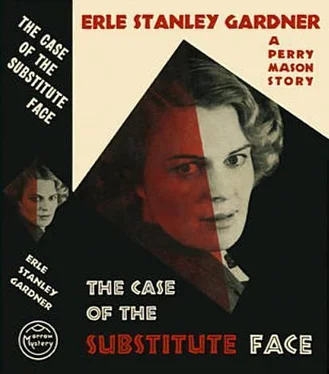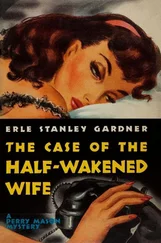“It’s been identified,” Cutter said.
“Only by your recollection of the appearance of the watch. Suppose you identify it by numbers. You may save yourself a lawsuit.”
Cutter hesitated a moment, then pressed a button. A young woman opened the door from an adjoining office. The clack of typewriters and the clatter of adding machines poured sound into the room. “Get me the account of Custer D. Rooney,” Cutter said.
The girl nodded, vanished, came back in a few moments with a card. Cutter laid the card on the desk, pried back the cover on the wrist watch, adjusted a magnifying glass to his eye, and nodded his head. “This,” he said, “is the same watch.”
Mason said, “I think there’s been a mistake somewhere,” and leaned across the desk, but didn’t pick up the wrist watch. Instead, he picked up the card. He studied it a moment, then turned to Marjory Trenton and said, “Did you know he was married, Margie?”
Rooney jumped to his feet and said, “Look here, I don’t see what the hell...”
“And,” Mason said, fixing him with a cold eye, “you’ve purchased four thousand, six hundred and fifty-two dollars and twenty-five cents’ worth of jewelry within the last two months at this place alone. Now, then, Mr. C. Denton Rooney, would you mind telling us where you secured the money with which to pay for these purchases?”
Cutter sent his chair crashing backward. He lunged forward and grabbed at the card which Mason held. Mason jerked the card back from Cutter’s grasp, and Cutter shouted to the officers, “Arrest that man! I don’t give a damn who he is!”
One of the officers moved forward. Mason stepped backward, his outstretched left arm holding the officer back, his right hand keeping the card behind his back. “Don’t be a fool,” he said to the officer. “Look at Rooney.”
Rooney collapsed into a chair, as though his knees had suddenly become unhinged. His face was gray and pasty.
Mason said, “You’re head auditor at the Products Refining Company, Rooney. You draw a salary of four hundred and sixty dollars a month. Between two and three months ago, Carl Moar, who worked under you as a bookkeeper, mysteriously disappeared. You immediately called the attention of the directors to the fact that there was a shortage in the books. You knew that shortage would be discovered anyway, because they’d insist on a complete audit, with a bookkeeper vanishing as Moar did. Now then, perhaps you’ll be kind enough to explain to these gentlemen how you managed to save enough money to buy almost five thousand dollars’ worth of jewelry out of a salary of four hundred and sixty a month.”
Rooney made a deprecatory gesture with his hands, and said, “All right, you’ve got me.”
“How long,” Mason asked, “has this embezzlement been going on?”
Arthur Cutter slowly seated himself in his big swivel chair.
“By God,” he said, “I don’t like this.”
“No one asked you to,” Mason told him. Then, turning to Rooney, “How long has this been going on, Rooney?”
Rooney said, “Look here. We can fix this thing up. No one needs to know anything about it except us. I’m related to Charles Whitmore Dail, the president of the company. He’ll give me hell, but he’ll put up the money rather than have the scandal.”
One of the officers moved forward. Mason motioned him back and said, “But there has to be someone for a fall-guy, Rooney.”
Rooney’s eyes, sullen and defiant, met Mason’s. “Moar could be the fall-guy.”
“And what do you suppose Moar would have to say to that?” Mason inquired.
“He won’t say anything,” Rooney said, “he’s dead. He was killed last night coming on the steamship to San Francisco from Honolulu.”
“Are you sure?” Mason asked.
Rooney said, “Of course I’m sure. Mr. Dail and his daughter were on the same ship. Celinda became suspicious of Carl Moar’s stepdaughter. She sent me a wireless asking me to find out all about a Belle Newberry who had graduated from the University of Southern California. I found out her mother was Ann Newberry, who had married Carl Moar.”
“And notified Celinda?” Mason asked.
“Yes,” Rooney said. “And then this morning Celinda telephoned me to tell me what had happened. Mrs. Moar murdered her husband last night. Now, we can fix this thing all up so there won’t be any publicity.”
Mason grinned. “No, we can’t, Rooney. And when you see Mr. Charles Whitmore Dail, you might tell him that Perry Mason asked you to remind him that chickens have a habit of coming home to roost. Come on, Paul, we have work to do.”
Standing on the curb in front of Coontz Cutter’s office, Drake mopped his forehead with a handkerchief, looked reproachfully at the lawyer and said, “Perry, you told me you were only going to carry on the act until she flushed Rooney from cover.”
Mason said, “Well, I changed my mind.”
“I don’t suppose it makes any difference to you that you damn near scared me to death, ” Drake said. “How did you know he’d done embezzling?”
“I didn’t,” Mason confessed. “It was just a hunch. When he latchkeyed the door of that apartment I figured it would be a good time to see it through.”
A cruising cab saw Mason’s signal, swung into the curb.
“What would have happened if we hadn’t been able to make it stick? ” Drake asked.
Mason grinned. “You’d probably have had your supper in jail, Paul.”
“Good Lord, Perry, you take awful chances,” Drake said, as he climbed into the cab.
“I like to gamble,” Mason told him.
“I’ll say you do!”
It lacked twenty minutes to five when Mason opened the door of his private office and ushered Paul Drake into the room.
Della Street, seated at a private switchboard, with an ear phone clamped over her head, and covering her right ear, looked up as they entered, snapped a plug and said, “What’s new, Chief?”
“The embezzlement business is out, ” Mason said.
“You threw a scare into Rooney?” she asked.
“Did more than that,” he told her. “Rooney confessed. He’s the embezzler. What’s new at this end?”
Della Street consulted a notebook. “They’re holding Belle Newberry in San Francisco without charges. They’re holding the mother on suspicion of murder. They found a thirty-eight caliber revolver on the boat deck. Two chambers had been fired. They’ve identified Mrs. Newberry as Mrs. Moar and one of the San Francisco papers has run a story about the embezzlement. Roy Hungerford’s waiting in the reception room.
“I thought we’d head off that embezzlement,” Mason said, dropping into the big swivel chair back of his desk and looking at his wrist watch. “Seconds were precious. I guess we missed it by a matter of minutes. What does Hungerford want?”
“I don’t know. I’ve been too busy to see him. I’ve engaged a suite of rooms in San Francisco and have a plane chartered and waiting.”
Mason said, “Get me the district attorney’s office in San Francisco. Find out who’s in charge of this case and get him on the line.”
“Donaldson P. Scudder is in charge,” she said. “Just a minute, I’ll get him on the line.”
She moved a mouthpiece up to her lips, snapped a switch and put through a call.
Mason said, “Wait here, Paul. I’m going to see Hungerford.”
“Want me to get out,” Drake asked, “and let you have the office?”
Mason said, “No. I’ll see him in the law library.” He walked through the law library to the reception room, opened the door and said, “Come in, Hungerford.”
Hungerford jumped to his feet and shook hands with Mason as the lawyer closed the door of the library and motioned toward a seat. “Well?” Mason asked.
Читать дальше












